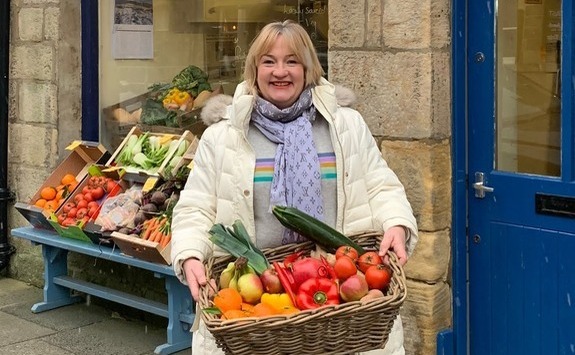Resilient rural businesses innovate and diversify during COVID
NICRE findings show impact of the pandemic
21 January 2022
But despite this, the impact of Covid and related control measures still caused substantial disruption to rural enterprises, with 42% of rural firms experiencing decreased turnover and 37% reporting mainly negative effects in the 12 months prior to the survey. While almost half of rural firms reported economic uncertainty due to Covid as a major obstacle to success, with high numbers citing reductions in sales/income and productivity and interruption to supplies.
The findings from NICRE, established to foster rural enterprise and unlock the potential in rural economies, provides an assessment of the effect the Covid-19 pandemic has had on the experiences and resilience of rural businesses in three regions of England. It is the first in a series of State of Rural Enterprise Reports.
NICRE director Jeremy Phillipson, Professor of Rural Development at one of its founding academic partners the Centre for Rural Economy at Newcastle University, said: “For the first time we have a clear picture of how rural businesses have been affected so far by Covid-19 as we begin another year confronting the pandemic and looking to recovery.
“The resilience and adaptation that rural firms have shown is phenomenal. Many thousands have responded to Covid-19 by diversifying their business, creating new sales platforms and finding innovative ways to reach existing and, crucially, new customers. Their efforts have been helped by tremendous support from local communities and often backed by a strong family network.
“This not only demonstrates the deep-rooted determination we’ve seen in rural areas during previous crises, such as the foot and mouth disease outbreak, but evidence of a desire to innovate and pivot their business model in response to market challenges and opportunities.
“But we must not allow these results to mask the need for ongoing support for rural enterprise as the Government seeks to Level Up Britain. Rural areas must not be neglected nor marginalised as 'hard to reach’ when restoring disruption to supplies – a key issue during the pandemic – and, given the wider infrastructure challenges that rural businesses and communities face, all agencies must work together to bolster business resilience.”
Wilkins Fine Dining, which provides high-end outside catering for weddings and corporate events, is one rural business in Rothbury, Northumberland, which diversified during Covid-19.
With celebrations postponed and venues closed, chefs Neil and Mary Wilkins created the ‘Rothbury Food Truck’ and sold takeaway meals direct to the community. They also branched out to deliver fruit and veg boxes which proved so successful they opened a shop in the village.
“For us, it was about survival,” said Neil, who trained and worked in five-star restaurants in London, the South of France and America before returning to his native North East.
“From doing two to three weddings a week, our business literally dried up within the first couple of weeks of lockdown and we had to diversify, or we would have had to shut it down.
“The food truck saved our bacon, and I cannot thank the people of Rothbury enough for the fantastic support we have had from them. Similarly, what started with delivering a few fruit and veg boxes to elderly neighbours snowballed to us opening a shop, thanks to community support.
“It’s certainly been a learning curve – from setting up card payments and a booking system for our takeaways to running a shop – and we’ve needed to be resilient. But we’ve been lucky, a lot of rural businesses haven’t made it.”
The survey, led by fellow NICRE founding university partner the Enterprise Research Centre, also found there was widespread uptake of government support with 79% of rural businesses accessing at least one form of support, and they used a range of mechanisms to cope with family and community support key.
The report has been welcomed by the Department for Environment, Food and Rural Affairs and business leaders.
Minister for Rural Affairs Lord Benyon said:“Rural businesses are central to this Government’s ambitious levelling-up agenda.
“This report demonstrates both the fundamental resilience of rural businesses and the success of government initiatives to help businesses keep going through the pandemic.
“It also underscores the importance of rurally-sensitive and local approaches to economic development to ensure a sustained recovery. By better understanding the needs and experiences of rural businesses, we can continue to help rural areas grow and improve, both socially and economically.”
Mike Cherry, National Chair, Federation of Small Businesses (FSB), said: “Covid prompted many small businesses to reinvent themselves, adding new products and services and adapting their offering to new types of customers, moving to new sales channels, creating or expanding their online presence, and much more. This report is a testament to the resilience of small businesses, which are the lifeblood of rural communities.
“But despite their resilience, the pandemic also demonstrated that businesses in rural parts of the country are having to cope with inadequate physical and digital infrastructure, and the Government should do more to level the playing field for rural firms.
“As the country embarks on the road to recovery, the Government support that was a lifeline for businesses during the pandemic should be translated into investment in rural communities, to help them Level Up. From pressing ahead with the rollout of gigabit capable broadband to guarantee full coverage by 2025 as initially promised, to offering support for businesses ready to transition to net zero, no business – regardless of its location – should be left behind.”
Alan Welby, Director of Innovation at the North East Local Enterprise Partnership (LEP), said: “We already knew that rural businesses have a tendency to innovate. This report shows there is no clear evidence that rural businesses lag behind urban ones and therefore should not be neglected when it comes to business support. Innovation is critical to our prosperity, driving business growth and creating more and better jobs.
“This report will now form part of the intelligence driving the North East Innovation Programme and implementation of innovation support through the planned UK Shared Prosperity Fund.”
Dr Jason Beedell, Rural Research Director, Strutt & Parker, one of NICRE’s business partners, said: “We wanted to be involved in NICRE to help rural businesses reach their potential. This report does just that. It is essential reading for policy makers and anyone who is passionate about the economies of rural places.
“It shines a penetrating light on how rural businesses have fared during the Covid-19 pandemic. It highlights that although two out of five rural businesses were negatively affected by the pandemic, they were at least as resilient as urban businesses and many of them innovated in ways that would not have been predicted.
“But it also provides detailed pointers on where they need more support. Their management tends to be more informal than their urban counterparts and they don’t have as many contacts or as large a network of advisers and mentors.
“This report – and forthcoming ones - provide the evidence for policy makers on how they can support rural businesses, which in turn will support the whole UK economy.”
Read the full Report.
View the Infographic.

